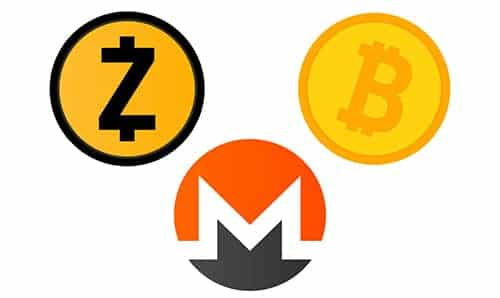Could Monero Ever Challenge Bitcoin? The Case for Privacy Coins
When Bitcoin was first envisioned and developed by Satoshi Nakamoto, the goal was to create a truly decentralised, anonymous and secure digital currency. The anonymity point was a strong one as people valued privacy.
Due to the fact that Bitcoin addresses were nothing but a string of numbers, people were happy to know that their funds were not attached to their offline identity. They happily used Bitcoin with this belief in place.
However, a great deal has changed since the initial days of Bitcoin's infancy. The most important of these is the sophistication with which Bitcoin transactions can be tracked, traced and later used tode-anonymize a user.
Privacy is not something that is only valued by those who are breaking the law. It is valued by many law abiding citizens who do not like the notion that Big Brother is watching how they spend their money and how much money they have.
Hence, as Bitcoin becomes much easier to trace, could privacy coins eventually challenge its dominance?
The Blockchain, Double Edged Sword

One of the greatest innovations of the Bitcoin protocol was the use of a decentralised ledger that would record all of the Bitcoin transactions. This was an immutable record of all transactions that has taken place that could be easily verified.
However, in order to fully verify the transactions using blockchain, it had to be public. It had to be open to anyone to view, analyse and effectively audit. Anybody could see the amount that was sent and the transacting party's addresses.
As technology has progressed, so has the ability to study and audit the blockchain to track transactions. Indeed, there are a number of companies that are able to complete blockchain audits like Chainalysis.
What is even more disconcerting for the Bitcoin users is that essential participants of the Bitcoin ecosystem are developing strong tracking algorithms. It was recently announced that a large mining company, Bitfury, is tracking transactions using clustering algorithms.
These have been used to great effect to identify those that have been responsible for crimes on the blockchain. The most notable example would be that of Alexander Vinnik, who was accused of the infamous Mt Gox hack. The authorities were able to track the coins that flowed out of the exchange.
While no one can dispute the use case of tracking criminals, one has to question whether such blockchain tech could be abused by malicious actors. For example, if a hacker was able to identify a high valued account and attribute it to a person, they would pose a threat.
They could use sophisticated phishing attacks that would target the individual and extract their private keys. Of course, criminals could also do worse as we have seen cases of users getting kidnapped for their cryptocurrency.
Focus on Privacy
Given all of these concerns that many seem to have with Bitcoin, users are looking for alternative privacy coins that are better able to hide their activity.
As was the case with Bitcoin, those that are usually the most innovative in terms of adoption are those involved in some form of illegal activity. That is the reason that Bitcoin has become too mainstream for criminals.
Yet, much like Bitcoin, as more people become aware of the manner in which user's activity is being tracked, they are more likely to prefer alternative solutions. This is where other privacy cryptocurrencies with innovative technologies enter the void.
In the scope of privacy conscious coins, there are a number that are constantly hitting the market and touting new and untested protocols. However, there are only really two well established cryptocurrencies that are being used constantly for private transactions.
These are Monero and Zcash.
Advanced Privacy Protocols

In the case of Monero and Zcash, both are able to completely hide the information of the users and the transaction details. However, they use completely different protocols and technology in order to achieve these ends.
Monero (XMR) is highly advanced cryptocurrency that was forked in 2014 from Bytecoin. It makes use of something called stealth address which means that after every single transaction is made, a completely random single use address is created.
The transaction will then pass through this single address which will hide the details of the actual receiving address. This will then remove any doubts of being able to link a particular transaction with Monero to an address.
However, in order to completely hide the transactions from public view, the protocol makes use of an advanced cryptographic technique called "Ring Signatures". These are used to create Ring Confidential Transactions (RingCT).
RingCTs essentially mix the real transaction with a number of other transactions that exist already. This means that the actual transaction is easily obfuscated with a certain plausible deniability. These also became mandatory on all transactions in September of 2017.
This mandatory implementation was the final step in making certain that the entire Monero ecosystem was as private as possible. Everyone, irrespective of preference, had to make use of a RingCT transaction.
This has indeed proved to be quite effective at hiding the privacy of the users. For example, Coinfirm, a Blockchain compliance company, claims that all Monero transactions are "high risk" for money laundering. As a comparison, they only treat 10% of Bitcoin transaction as high risk ones.
This may concern some people about the nature of the coin. Yet, as highlighted by core developer, Ricardo Spagni, in a bloomberg interview, most of the users of the coin use it for legitimate purposes. He said that he would like people to be able to spend the coins such that no one knows what they are buying or how much they have.
Just because users are concerned about privacy does not mean that they have anything to hide. It is a similar argument that is often given by anti-privacy proponents when promoting mass surveillance programs such as that of the NSA's prism. It is also for this reason that people are looking for alternative methods of private internet access and other anonymising technology.
Zcash vs. Monero

The only other cryptocurrency that is being used in larger amounts as a privacy conscious alternative is ZCash (ZEC). This makes use of technology called Zero Knowledge Proofs. In the case of the Zcash protocol, these are called ZK-snarks.
ZK-snarks make all of the transactions private and the transactions are "proofed" with Zero-knowledge. Essentially, the transaction data is not known by any parties and is fully encrypted.
One of the concerns that people have with Zcash though is that 10% of the initial supply of the coin was given to the founders that are a company. This makes the cryptocurrency quite centralised which is the antithesis of crypto in general.
Another concern about Zcash comes down to the Zero-Knowledge proof protocol. Given that all of the data is encrypted and hence hidden, the total supply of coins is also hidden and cannot be properly and effectively verified.
This lack of external verification places a great deal of trust in the centralised parties controlling Zcash. Moreover, the Zcash protocol does not require all mandatory private transactions. That means that those that do send private transactions can be identified via traffic analysis.
Lastly, sending private transactions with Zcash takes a great deal of computer resources to properly encrypt the data. This process requires machine ram in excess of 3mb and takes about 40 seconds to fully encrypt the data for the transaction.
The CEO of Zcash, Zooko Wilcox, stated that the Zcash team will be releasing an upgrade called "Sapling". They hope that this will reduce the resources required for the transaction as well as institute the mandatory private transactions.
There is also the hope that if Zcash is able to implement an interesting new variant called ZK-starks, then it could become truly private.
Potential Alternatives
There are other alternative privacy coins that are either available right now or are being developed. For example, the Dash cryptocurrency makes use of transaction mixing through their "Darksend" functionality. However, the result is merely the same as if one was to use a Bitcoin tumbler service.
Then there are newer privacy coins that want to try and cut their teeth in the market. One of those is Verge (XVG) that uses the Tor protocol and I2P to send coins. This will allow users to anonymise their IP addresses. However, there were a number of concerns around Verge as the currency suffered pump-and-dump traders.
Another interesting privacy coin that is making some headway is Zclassic. This is essentially just a fork of Zcash that removes the 10% pre-mine that was attributed to the founders.
Altough the Zclassic project has just picked up interest recently, it uses similar technology to that of Zcash and as such cannot be fully trusted when it comes to the available supply or network integrity.
Monero Best Alternative
It therefore seems, in an age of increasing surveillance and tracking that the only cryptocurrency that can be reliably used, 100% safe and completely private is Monero.
Although Zcash does have more advanced encryption when it comes to the Zk-snarks, the underlying reliance on trust of others may be too much to bear. Nothing can be verified as nothing is known. One can only wait for the Zcash updates to roll out before they can fully trust the technology.
Monero is also slowly shaking the "shady" associations that is often bestowed upon it. There is increasingly large adoption of the coin as evidenced by the moves by musicians to accept Monero as a form of payment for their concerts.
Now, no one will know that you ever purchased a ticket to a Dolly Parton concert. That's the power of a privacy coin!
Disclaimer: These are the writer’s opinions and should not be considered investment advice. Readers should do their own research.
